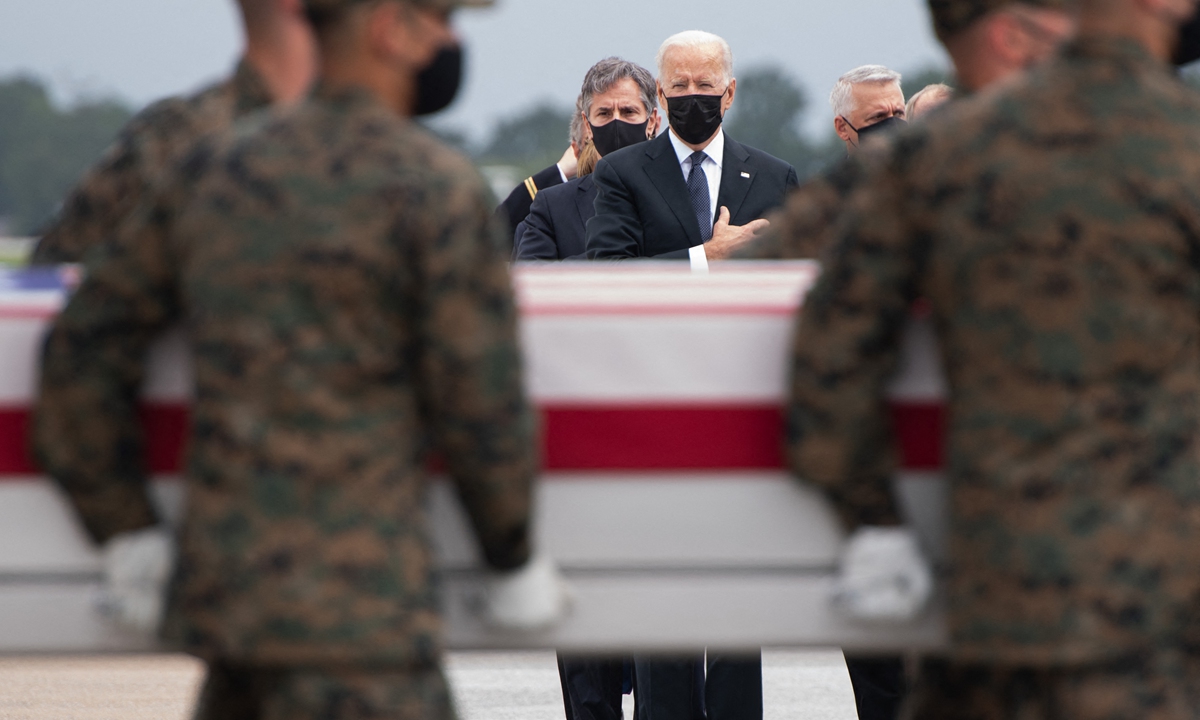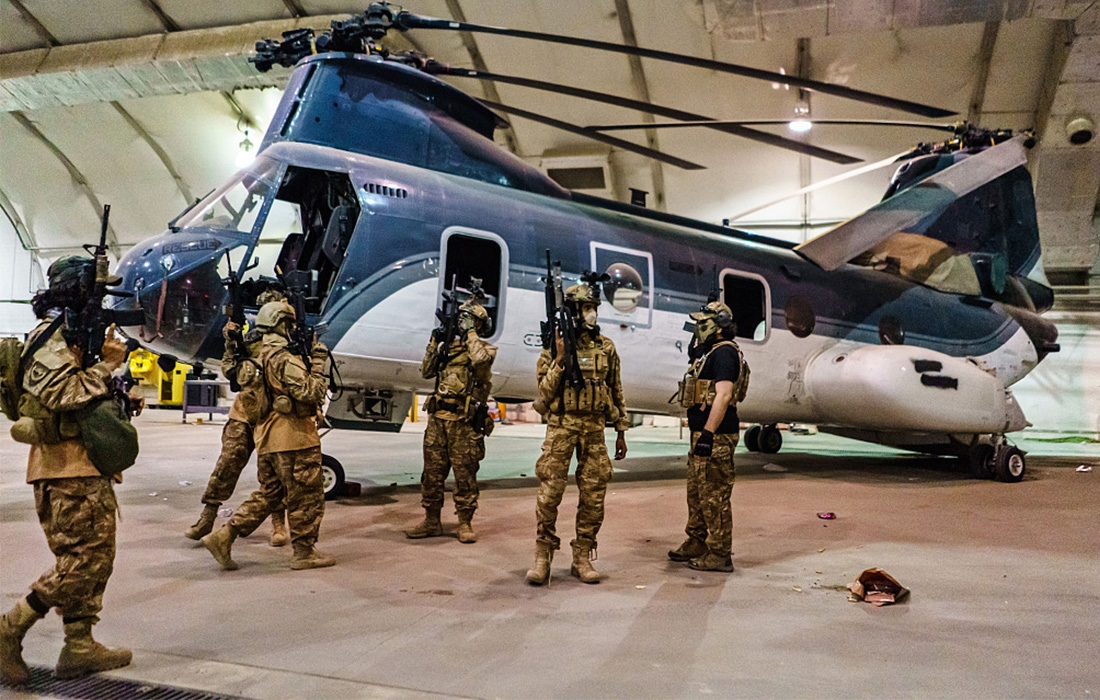Biden fails to 'deodorize' US failure in Afghanistan
China, Russia could play important role in Afghan rebuilding

US President Joe Biden (center) attends the dignified transfer of the remains of fallen service members at Dover Air Force Base in Dover, Delaware, on Sunday. Photo: AFP
US President Joe Biden has been flooded with criticism for his poor handling of the chaotic withdrawal from Afghanistan, and a speech on Tuesday in which he vigorously defended the withdrawal as an "extraordinary success," with Chinese analysts slamming him for "turning a funeral into a wedding or painting a tragedy into a matter for celebration."
Instead of reflecting on its mistakes and learning lessons, Washington uses China and Russia as scapegoat to deal with the current political crisis and is also determined to open up a new battlefield in the Western Pacific, analysts said.
They also noted that the US government and some Western media are hyping terrorism threats to the region after the Taliban takeover, trying to shift responsibility of dealing with the messy situation to China and Russia. But the threats to China and Russia are under control and the Afghan Taliban will also try its best to fulfill its promises to win support for the country rebuilding.
When addressing the nation on Tuesday - a day after the US officially ended its "forever war" in Afghanistan, Biden defended the chaotic withdrawal of US forces and said his administration has evacuated the vast majority of Americans who wanted to leave Afghanistan.
"We completed one of the biggest airlifts in history, with more than 120,000 people evacuated to safety. That number is more than double what most experts thought was possible. No nation, no nation has ever done anything like it in history. Only the United States had the capacity and the will and the ability to do it, and we did it today," said Biden.
He emphatically described the withdrawal as an "extraordinary success" and further explained his reasons for pulling out of Afghanistan by saying that "the world is changing" and the US is engaged in a serious competition with China and dealing with the challenges on multiple fronts with Russia.
It is not surprising to see Biden use China and Russia as scapegoats to help lift himself from the major diplomatic crisis because the mentality of shoring up the US to better compete with China and Russia has been popular in the US. But the US debacle in Afghanistan is too big to cover and will have great influence on US domestic politics, Li Haidong, a professor at the Institute of International Relations of the China Foreign Affairs University, told the Global Times on Wednesday.
The rhetoric that Biden has used in his speech on Tuesday is more like trying to "turn a funeral into a wedding or painting a tragedy into a matter for celebration." The humiliating evacuation of more than 120,000 people from Afghanistan has never been seen in history and so did the US debacle in history, Li said.
Given the current situation, the prospect for Biden to successfully seek a second term is not that promising. Whether the Republican Party will choose former president Donald Trump, Mike Pompeo or Marco Rubio to run, the chances for Biden to win if he insists on running for re-election will be slimmer, Li noted.
Biden has been flooded with criticism for his handling of the withdrawal from both Republicans and some members of his own party. According to a Forbes article on August 26, after the deadly blasts at Kabul airport which killed nearly 200 Afghans and 13 US servicemen, nearly two dozen House and Senate Republicans called for Biden to resign.
A poll released by the Pew Research Center on Tuesday showed that 69 percent of the public said the US mostly failed in achieving its goals in Afghanistan and 42 percent thought the Biden administration had done a poor job in handling the situation in Afghanistan.
As a veteran politician, Biden craftily shifted responsibility to his predecessor Donald Trump by saying his hands were tied by Trump's previous treaty with the Afghan Taliban, and to China and Russia by hyping their threats, analysts said.
"There's nothing China or Russia would rather have, would want more in this competition than the US to be bogged down in another decade in Afghanistan," Biden said.
After ending the "forever war" in Afghanistan, the US will surely pivot to the Western Pacific to have strategic competition with China and Russia, which shows that US political elites are stubborn and not willing to reflect on their mistakes. Instead of drawing lessons from their failure in Afghanistan and correcting the chaos it has left to the world, the US is trying to open a new "battlefield" in the Western Pacific, Li said.
"It seems that without creating chaos, destruction, enemies and rivalries, the US elites would not know how to define the US' global role. But one question we want to ask: after a string of failures in Iraq, Syria and Afghanistan, what makes the US think it can defeat China? Do these US politicians really think the US is stronger than before or China is becoming weaker?" Li asked.

The Taliban storm into Kabul International Airport, wielding America-supplied weapons, equipment and uniforms after the US troops completed withdrawal from Kabul, Afghanistan, on Aug 31, 2021. Photo: CFP
Shifting responsibility
One more important issue that needs to be answered has been played down by Biden in his speech on how the US and its Western allies are going to help with the current situation in Afghanistan and its rebuilding, analysts said, noting that both the Biden administration and the US have been creating momentum to shift the burden to China and Russia.
Biden noted that the US will continue to support the Afghan people through diplomacy, international influence and humanitarian aid. No details have been given, but emphasis on "human rights" is the "center" of US foreign policy.
The ending of its military presence does not mean the end of responsibility. However, the US, who is mainly responsible for the chaos and destruction in Afghanistan, wants to pass the buck to China and Russia, Liu Zhongmin, a professor at the Middle East Studies Institute of the Shanghai International Studies University, told the Global Times.
Some Western media have been hyping the threats to the regional countries, especially China and Russia after Taliban's return to power.
For example, a report from the Wall Street Journal on Wednesday said that the gloating and schadenfreude of China and Russia for seeing the humiliation of the US "is turning to a more sober view" of how the war and the withdrawal will affect the global balance of power and they need to face the direct consequence of the Taliban takeover, from refugee flows to terrorism to the drug trade."
Liu said that the hype of Western media on such a topic is not unusual: whenever the US or Western countries pull out from one area or experience failures in imposing their democratic model in certain countries, they would assume the area will fall into clashes.
"Both the US and the West want to use this cliché to make the rebuilding of Afghanistan become China and Russia's responsibility by hyping the regional threats. But neither China nor Russia feels the threats," Liu said.
The expert noted that China shares a small stretch of border with Afghanistan on the Wakhan Corridor in its Xinjiang region. "The severe environment and terrain makes it impossible for terrorists to sneak into China from Afghanistan. We also have the regional counter-terrorism mechanism under the Shanghai Cooperation Organization with China, Russia and Central Asian countries working smoothly," Liu noted.
China had a two-day joint counter-terrorism drill with Tajikistan, a country that shares a long border with Afghanistan, in Dushanbe on August 18 and 19, aiming to strengthen coordination of counter-terrorism forces of the two countries in the face of terrorism threats in the region.
On August 10, Russia completed joint military exercises with troops from Tajikistan and Uzbekistan, Russian media reported.
The Taliban also know that China and Russia are important powers in the region that could play important roles in the country's rebuilding and in seeking international recognition. It will also try its best to fulfill its promises, Liu said.

